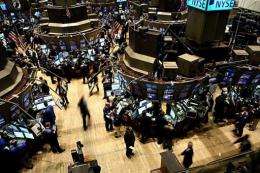Wall Street's super traders come under fire

A handful of traders who master stock markets using ultra-fast computers may soon face a clampdown by US watchdogs as they try to prevent freak electronic glitches.
Regulators are poised to curb so-called high frequency trading that uses sophisticated algorithms to analyze equity markets and trigger trades at lightning speed.
The practice, also known as HFT, today accounts for more than half of daily US stock trade.
Around 100 secretive HFT companies are being pushed into the spotlight in the wake of the May 6 "flash crash," which saw the Dow Jones index sink over nine percent within minutes, only to recover seconds later.
Although the reasons for the crash are still being studied, it is largely blamed on the automated trade that dominates modern markets, and specifically on its most intricate form, high frequency trading.
The Securities and Exchange Commission, the governmental body overseeing US stock markets, will release later this month its report on the crash that is set to include steps to limit certain HFT methods.
The commission's chairwoman Mary Schapiro on Tuesday said that the introduction of HFT in recent years "has raised serious questions and concerns" and is driving away from Wall Street many Americans who fear repeats of the May crash.
Critics say HFT firms are picking up easy profit by beating everyone else by split seconds while acting irresponsibly in the stock exchanges where they are not restricted by regulation, with some not even registered as brokers.
A key driver for the "flash crash" is believed to be the HFT computers, which automatically stopped trade at the start of the slide, drying up liquidity instantly and sending the markets crashing.
One measure already applied to prevent similar crashes are circuit breakers that automatically halt trading on a single share if its value plummets by more than 10 percent within five minutes.
But while some argue HFT, or algo-trading, undermines fundamentals of the stock market -- the emblem of US capitalism -- others say the sophisticated computers help stabilize today's increasingly fragmented market.
Computerized trading has been a ubiquitous part of trading since the 1980s, improving the stability, accuracy and speed of the marketplaces by replacing the traditional manual methods.
High frequency trading was first used in 2007 and has again transformed trade, increasing its daily volume tenfold over 10 years, reaching 9.8 billion shares in 2009.
If a trade would take minutes in the 1970s, second in the 1980s, and later milliseconds, today HFT executes deals in microseconds, or one millionth of a second.
Despite its heavy trade volume, HFT generated a modest 21 billion dollars in profits in 2008, estimated the Tabb Group, a research firm.
The HFT traders generally use well-known trading strategies, buying low and selling high, but their extreme speed puts them beyond reach of traditional traders, said James Angel, a professor at McDonough School of Business.
Cameron Smith, general counsel at Quantlab, a Houston-based HFT firm, said their speed, simultaneous analysis of numerous markets and massive trade volume generates liquidity that stabilizes markets and ensures that shares are traded at fair value.
"The speed that we need to act upon is actually a sign of the health and vitality and competition of the market," Smith told AFP.
But several HFT trading strategies have raised the ire of investors and prominent US politicians and are under close examination by the SEC.
One of the most controversial methods is order cancellations, when computers buy or sell massive quantities of shares only to cancel most of the transactions within milliseconds.
This leads shares to rise by tiny increments of a fraction of a cent, allowing the trader to cash in thousands of dollars per transaction.
"They can push the price up by creating momentum... These are the kinds of activities that are certainly unethical and at a certain level probably border market manipulation," said Sandip Bhagat, head of equities at Vanguard, a large US investment house.
Schapiro said the SEC and other regulators "are looking carefully at certain practices in this area" to assess whether they are fraudulent.
But experts and investors fear that the current political climate could lead to excessive measures against HFT, which would ultimately harm trade.
"We would urge the regulators that they look for nuances on the topic, that they don't paint with one broad brush the whole activity as being unpatriotic or ill advised," Bhagat said.
(c) 2010 AFP

















